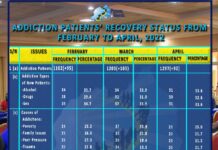Giving sacrificial and unconditional love to a person struggling with addiction is the best transformative medicine every addict needs throughout the journey of recovery
This is how Purpose Rwanda welcomes new beneficiaries: Everyone is sick and needs help. No one is better than anyone of you at Purpose Rwanda; God has created every one for a specific purpose, we are all created in the image of God. We have directly or indirectly gone through terrible addiction experiences before, but with the Grace of God, we managed to overcome, God loves you, that is why He created you, God’s love for mankind is unconditional and ineluctable, your community loves you, but let’s make this work better for you as it did to us as well, be hopeful because your addiction problem can and will be cured.
When we speak about love, we are not referring to Eros (physical or sexual love); not Philos (warm affection or friendship). The love we accord to the addicts is Agape love which is the sacrificial, unconditional love of God. This is the highest form of love anyone needs and it’s priceless.
The power of love in the recovery journey of addicts as explained:
1. Love serves as a powerful motivator in the recovery of addicts. The environment PR provides is a concrete testimony that no one is judged or ridiculed because of the sickness situation they find themselves in. When addicts are received with love first and foremost, they always come back because the environment is conducive, the first impression is good one and this matters most. This provides them with a sense of purpose and support.
A Volunteer Counselor hugging one of the Recovering Addict after Group Counseling
2. When addicts are shown love and compassion, they feel valued and accepted. These reduce feelings of shame and guilt. Every human being feels worthy when valued and accepted. It’s from here that they regain self-esteem which was consumed by drugs, alcohol or sex addictions.
3. When an addict is shown love other than hatred and bitterness, love helps in creating a safe and non-judgmental environment for addicts. This conducive environment is supportive to enable the addicts express the burden of the struggles they are carrying and seek help. Purpose Rwanda counselors usually say, “In counseling, we do not provide solutions to the challenges addicts go through, but we guide them to find solutions that they can use towards their recovery”.
4. The presence of unconditional love and understanding can help addicts build self-esteem and develop a sense of self-worth. What defines our work at Purpose Rwanda is, when an addict feels down, lonely, broken, not loved, rejected, frustrated and isolated; we know this is short lived experiences when unconditional love is in force. The negative experience is replaced by hope and support, leading to recovery with the aim that this should lead into development of self-esteem.
5. Love helps addicts establish healthier relationships and connections in two ways: with themselves and with others, therefore, improving their recovery journey. Ability to handle self-challenges is well buttressed when we have healthier self-relations within our heart and mind for the sake of our own life. Healthier relationship with others help an addict seek necessary social and moral support and share life experiences from which they can build coping mechanism necessary to start a new life relationship.
6. Furthermore, love inspires addicts to forgive themselves for past mistakes they have committed and focus on positive changes. When an addict is appealing for forgiveness from members of the family or community, for the misdeeds caused by the influence of alcohol or drugs or even sex addiction, it’s advisable that he/she should be helped to first forgive himself/herself and start leading a transformed life. This creates crucial moment for forgiveness by family and community members.
7. Love promotes empathy and encourages addicts to consider the impact of their actions on others, fostering accountability and responsibility. An alcohol and drug addict only identified as Jean Paul one time asked, “Why is Purpose Rwanda so concerned about my wellbeing when my relatives have rejected me? He was told that when your life is transformed, many people including those working at Purpose Rwanda too will benefit. The life of Jean Paul from then and now has changed because of the priceless act of love and compassion extended to him. It’s the gesture of love experienced by Jean Paul that compelled him to fight his own drug and alcohol problems.
8. Expressing love towards addicts can inspire hope in them. It’s important to communicate to them that recovery is possible if they accept to start the recovery journey, that they are capable of attaining positive transformation and a better future. Hope in the life of an addict helps in reviving lost dreams. It further helps a recovering addict to start leading positive life, replace negative mindset with positive one, change of heart about life and start leading a purposeful life, hence, enhancing self-sufficiency.

A Preacher showing love to one of the recovering addict as others enthusiastically wait for their turn
9. Love from family and friends create a strong support system for the addicts: This helps in overcoming stigma and isolation. The addict opens up by shares his/her feelings, emotions, struggle experiences, fears, future plans and needs. Support given by the family and friends help the addict to appreciate the contribution of family members in his/her life. This is critical for the beginning of new chapter in the life of an addict. It’s crucial that family members persistently remind an addicted family member that he/she is part and parcel of the family.
10. Expressing love to an addict can have profound redemptive impact to the journey of recovery by nurturing his/her spirit and providing sense of support and understanding. Love serves as a stung source of motivation, comfort and encouragement, thereby, helping an addict revive his/her hope and redeem that sense of self-worth.
In the final analysis, showing love to an addict leads to recovery, therefore, building a Purposeful and Addiction Free Generation









